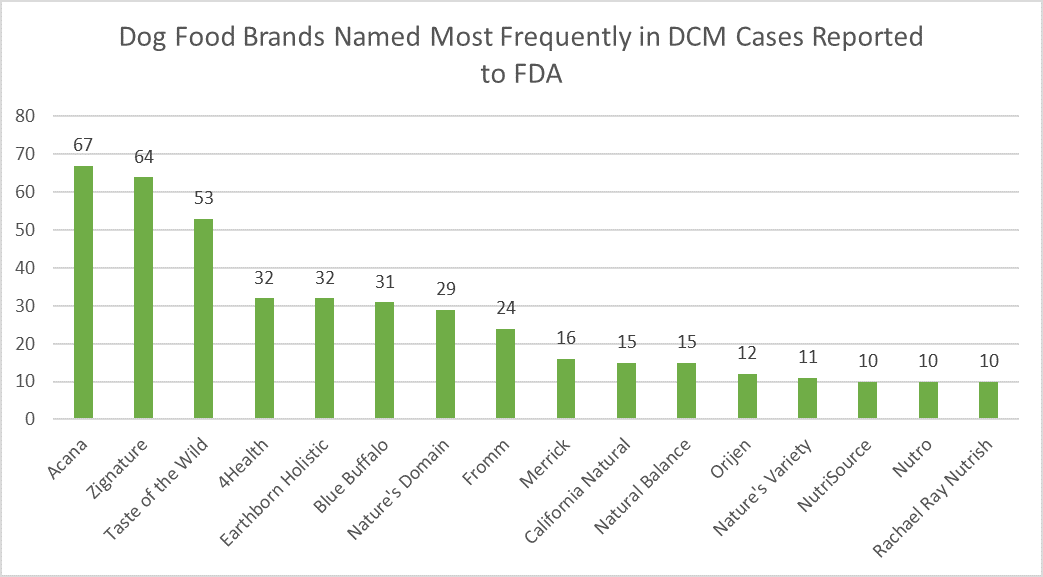
On June 27, 2019, the FDA published its third status report regarding a potential connection between grain-free diets and a type of heart disease in dogs known as dilated cardiomyopathy… or DCM. This subject has been revised several times since then.
The FDA has still not discovered why certain dog foods may be associated with the development of DCM. In fact, the Agency now believes the connection between diet and DCM is a complex scientific issue involving multiple factors. Results of the study remain inconclusive and there have been no dog food recalls related to this issue.
The FDA writes…
“It’s important to note that the reports include dogs that have eaten grain-free and grain containing foods and also include vegetarian or vegan formulations. They also include all forms of diets: kibble, canned, raw and home-cooked. “Therefore, we do not think these cases can be explained simply by whether or not they contain grains, or by brand or manufacturer. The FDA has received reports about 560 dogs diagnosed with DCM suspected to be linked to diet. Tens of millions of dogs have been eating dog food without developing DCM.
About DCM
DCM is a disease of a dog’s heart muscle that results in weakened contractions and poor pumping ability which can lead to an enlarged heart and congestive heart failure. The root cause of DCM remains unknown even though initially the condition appeared to be more common in certain breeds the FDA has received reports of DCM in a wide range of breeds, including many not genetically prone to the disease.
Link to Diet?
Since announcing its investigation in July 2018 FDA researchers have observed that most of these DCM cases were associated with animals eating dry dog foods. However dogs eating raw, semi-moist, and wet diets were also affected. In addition researchers found that over 90 percent of the reported recipes were grain-free and yet some dogs consumed diets that contained grain, too.
Which Brands?
Brands named most frequently in these reports are depicted in the graphic. Could the presence of these brands simply be related to their exceptional popularity?
Click here for a more detailed account of all DCM cases reported to the FDA as of April 30, 2019.

The FDA offers the following observation “the prevalence of reports in dogs eating a grain-free diet might correlate also to market share: these products have become exceedingly popular over the last several years.”
According to the FDA, researchers have uncovered one dietary feature common to a large number of DCM cases. “The common thread appears to be legumes, pulses (seeds of legumes), and/or potatoes as main ingredients in the food. This also includes protein, starch and fiber derivatives of these ingredients.” Some reports indicate that the pets were not eating any other foods for several months to years prior to exhibiting signs of DCM.
8 Things You Can Do Right Now
to Lower Your Dog’s Risk
Until the FDA completes its study and releases its final report consider these practical tips:
- Since compared to meat, vegetable protein tends to be incomplete (deficient in certain essential amino acids), you may wish to favor brands that derive most of their protein from animal sources
- Don’t avoid any brand just because it contains peas, legumes or potatoes. In reasonable amounts, studies have not found these ingredients to be toxic
- Favor brands that don’t list pea protein or other plant protein concentrates among their first few ingredients
- Avoid brands that use ingredient splitting to hide the fact that their recipes are dominated by non-meat items… like corn, rice or legumes
- Confused about grain-free? Consider switching your dog to a quality food that contains grain
- Focus on the recipe. Not the brand. To satisfy consumer demand, companies sometimes replace the meat in certain products with cheaper, plant protein alternatives. Yet many brands still offer other recipes with superior, meat-rich designs
- Don’t put all your eggs in one basket. Diversify. Since no dog food can ever be perfect, consider using diet rotation to lower the risk of endlessly feeding your pet the same imperfect product
- Want more choices? Consider switching your dog’s current diet to one of the many found on our best dog foods lists
The Bottom Line
Final results are still not conclusive.
And there’s no way to know how long the FDA’s investigation will take. Yet the Agency is hopeful that as more data becomes known, its scientists will gain a better understanding of the possible connection between diet and DCM.
